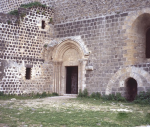You are here
Israel’s nuclear arsenal exposed
Mar 12,2015 - Last updated at Mar 12,2015
The Israeli elections next Tuesday are primarily focused on whether Prime Minister Benjamin Netanyahu of the Likud and his flip-flopping policies will get endorsement from a majority of Israelis.
Netanyahu’s strongest rival is Isaac Herzog, co-founder with Tzipi Livni of the Zionist Union Party, which endorses a two-state solution; he and Livni are described as a “blue-blood team”.
The headline of an article Allison Kaplan Sommer wrote last week in the liberal Israeli daily Haaretz read “Bibi fatigue: Israelis are sick of Netanyahu, but can’t agree on his replacement”, with a subheadline that said “The tide may be turning against Netanyahu, but it is turning in many directions and the Israeli public just can’t agree on a suitable alternative”.
The columnist was saying that the Israelis want change but “whether it’s going to change for better — that bet is far less certain”.
Netanyahu received countless ovations during his recent address to the US Congress, primarily because the Republican congressmen were eager to challenge President Barack Obama who decried Netanyahu’s inappropriate visit three weeks before the Israeli national elections.
But his anti-Iranian stance hardly earned Netanyahu additional support among Israeli voters.
A popular view in Israel is that “if Netanyahu wins re-election on March 17, the [Palestinian-Israeli] peace process loses” since the Israeli prime minister had devoted “almost zero attention” to making peace with the Palestinians.
Barak Ravid wrote last Monday in Haaretz: “Recently, most of the senior figures in Likud have taken to the airwaves to deny that Netanyahu had ever made [any] concessions — particularly the one about agreeing to conduct negotiations [with the Palestinians] based on the 1967 borders”.
After the 1967 war, Israel had control of 78 per cent of Palestine.
Under the UN Partition Plan, Israel was awarded 55 per cent of Palestine; now it militarily controls the entire country, except for the Gaza Strip, which is an area of 360 square kilometres.
More significantly, Israel never spelled out the borders within Palestine, unlike the Palestinians who had agreed to retain only 22 per cent of the former British mandate.
Nowadays, the large Arab community in Israel hopes to gain “much-needed muscle”, as put by Reuters, after next week’s parliamentary election, with four parties uniting under one banner for the first time.
Surveys show the Joint List could even finish third and become a factor in the coalition that dominates Israeli politics, where no party has ever won a majority in the Knesset.
Ayman Odeh, head of the Joint List, reportedly hinted that the faction may back Herzog, whose centre-left party is running neck and neck with Netanyahu’s right-wing Likud.
The question that still hovers around the White House nowadays is the future of the relationship between the Obama administration and Israel in the remaining two years.
Israel’s nuclear ambitions have never been disclosed publicly, yet it is making a great deal of Iran’s nuclear programme.
Walter Pincus, a prominent columnist for The Washington Post, began his Tuesday column thus: “Iran may be following the path of another country [Israel] as it seeks clandestinely to develop a capability to produce nuclear weapons.”
He continued: “Was Israeli Prime Minister Benjamin Netanyahu remembering his own country’s success in hiding its nuclear weapons programme in the 1960s from US inspectors when he questioned whether inspections will prevent Iran from getting a nuclear weapon?”
Using a metaphor, Pincus added: “The elephant in the House chamber was that Israel blazed a trail decades ago. Its own clandestine building of nuclear weapons facilities in the Negev desert began 60 years ago, and the country now has about 200 nuclear bombs and missile warheads.”
Pincus’ column ended by revealing a 1969 meeting between president Richard Nixon and Israeli prime minister Golda Meir who “agreed that Israel would not test atomic weapons, disclose possession of them or threaten any country with them”.
In turn, Nixon would stop pressuring Israel to join the Nuclear Non-Proliferation Treaty and threats that the US would visit Dimona, where the Israeli nuclear arsenal is kept, and “Washington would tolerate but not acknowledge Israel’s nuclear weapons programme”.
Pincus also said that “Israel’s own nuclear stockpile blocks serious consideration of President Obama’s proposal for a Fissile Material Cutoff Treaty or a Middle East nuclear-weapons-free zone agreement”.
He concluded that “both proposals have Iran’s verbal support and would present another route toward limiting Tehran’s path to a nuclear weapon”.
The writer is a Washington-based columnist.












